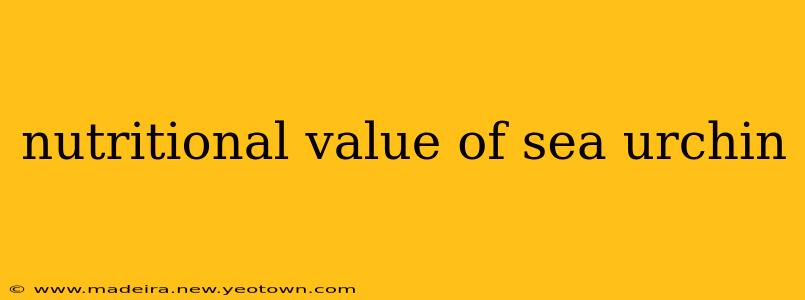Sea urchins. The name conjures images of spiky balls clinging to rocks, but beneath that prickly exterior lies a culinary treasure trove, a delicacy prized for its rich, buttery flavor. But beyond the gastronomic appeal, sea urchins boast a surprisingly impressive nutritional profile. This isn't just a fancy food; it's a powerhouse of nutrients. Let's dive in and explore the nutritional value of this unique marine creature.
What are the main nutritional benefits of sea urchin?
Sea urchin, specifically the reproductive organs (uni), are incredibly nutrient-dense. Think of it as a tiny package overflowing with essential vitamins and minerals. The main nutritional benefits stem from its high concentration of:
-
Protein: Sea urchin is an excellent source of high-quality protein, vital for building and repairing tissues, supporting healthy metabolism, and maintaining overall bodily functions. A serving provides a significant portion of your daily protein needs.
-
Omega-3 Fatty Acids: These essential fats play a crucial role in brain health, reducing inflammation, and supporting cardiovascular health. Sea urchin provides a good dose of these beneficial fats, contributing to overall well-being.
-
Vitamins & Minerals: The list is extensive! Sea urchins are rich in Vitamin A, Vitamin D, Vitamin E, Vitamin B12, iron, iodine, zinc, and selenium. These vitamins and minerals are essential for immune function, bone health, energy production, and a multitude of other bodily processes.
Is sea urchin high in cholesterol?
This is a common concern. Yes, sea urchin does contain cholesterol. However, the type of cholesterol present and its impact on blood cholesterol levels are still subjects of ongoing research. While it's prudent to consume sea urchin in moderation as part of a balanced diet, particularly for individuals with pre-existing cholesterol concerns, the overall health benefits often outweigh the cholesterol content, especially considering the richness of beneficial fats and other nutrients. Consult your doctor or a registered dietitian for personalized advice, especially if you have specific dietary requirements.
Are sea urchins a good source of protein?
Absolutely! As mentioned earlier, sea urchins are a notable source of high-quality protein. This makes them a valuable addition to diets for athletes, individuals seeking to build muscle mass, or anyone needing to increase their protein intake. The protein in sea urchin is easily digestible and offers a good balance of essential amino acids, which the body cannot produce on its own.
What are the potential health benefits of eating sea urchin?
The impressive nutritional profile of sea urchin translates into a range of potential health benefits:
-
Improved Heart Health: The omega-3 fatty acids and other nutrients contribute to cardiovascular health by reducing inflammation and improving blood lipid profiles.
-
Enhanced Immune System: The rich array of vitamins and minerals strengthens the immune system, helping the body fight off infections and diseases.
-
Improved Brain Function: Omega-3 fatty acids are crucial for brain health, supporting cognitive function and potentially reducing the risk of age-related cognitive decline.
-
Stronger Bones: The vitamin D and other minerals contribute to bone health and density, reducing the risk of osteoporosis and other bone-related issues.
What are the potential downsides or risks of consuming sea urchin?
While generally safe for consumption, there are some potential considerations:
-
Allergies: Sea urchin allergy, although rare, is possible. Individuals with seafood allergies should exercise caution.
-
Cholesterol Content: As mentioned earlier, sea urchin contains cholesterol. Moderation is key, especially for individuals with high cholesterol.
-
Toxicity: Some species of sea urchins may contain toxins depending on their diet and environment. It's crucial to source sea urchin from reputable suppliers who adhere to strict safety and quality standards.
-
Purine Content: Sea urchin is relatively high in purines, which can exacerbate gout symptoms in those predisposed to this condition.
In conclusion, sea urchin offers a unique and valuable addition to a healthy diet. Its impressive nutrient density provides a multitude of potential health benefits, but moderation and awareness of potential risks are important. As with any food, mindful consumption within a balanced dietary approach is key to reaping its nutritional rewards. Remember to always consult with a healthcare professional or registered dietitian for personalized dietary advice.

